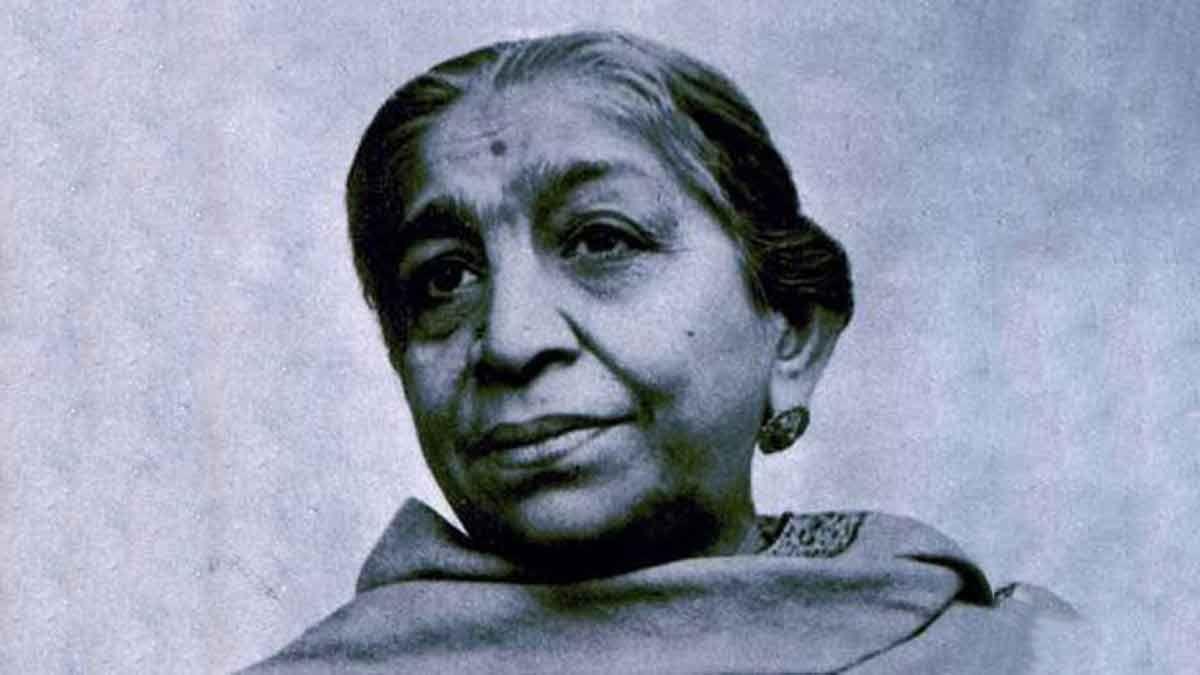
Sarojini Naidu, celebrated as the “Nightingale of India,” was a multifaceted personality whose life and works have left an indelible mark on India’s cultural and political landscape. A poet, writer, activist, and politician, Naidu’s journey is a testament to her dedication to India’s independence and her passion for social reform.
This Sarojini Naidu biography delves into her remarkable life, from her early years to her enduring legacy, inspiring generations with her contributions to literature, politics, and women’s empowerment.

Table of Contents
Sarojini Naidu Biography: Age, Career, Activism, Legacy, Wiki & Death
Sarojini Naidu Educational Background
Writing Career and Publications
Sarojini Naidu Political Positions and Appointments
Sarojini Naidu Activism and Influence
Sarojini Naidu Personal Life/ Sarojini Naidu Personal Information
Sarojini Naidu Recognitions and Legacy
Conclusion: Sarojini Naidu Biography
Sarojini Naidu Biography
Sarojini Naidu, also known as Sarojini Chattopadhyay, was born on 13 February 1879 in a Bengali family in Hyderabad. Her father, Aghorenath Chattopadhyay, was a renowned scientist and linguist, and her mother, Barada Sundari Devi, was a poetess.
Read Also: Sudha Chandran Biography: Age, Career, Wiki & Net Worth 2025
Sarojini’s upbringing in an intellectually vibrant environment profoundly influenced her literary pursuits and activism. Affectionately called Bharat Kokila, she was the eldest of eight siblings and showed prodigious talent in academics and the arts from an early age.
Sarojini Naidu Educational Background
Sarojini Chattopadhyaya educational journey began in India, where she excelled academically, topping the matriculation exams at Madras University at just 12 years old. Her brilliance earned her a scholarship from the Nizam college of Hyderabad to study abroad.
She attended Kings College in London and Girton College, Cambridge, where she encountered influential literary figures such as Edmund Gosse and Arthur Symons (Arthur Simon). Encouraged by Gosse to explore Indian themes in her poetry, Naidu developed a unique voice that blended Indian cultural motifs with the lyrical traditions of British Romanticism.
Sarojini Naidu Career
Political Career
Sarojini Naidu’s political career was intertwined with her advocacy for India’s independence and women’s rights. In 1906, she addressed the Indian National Congress, voicing her support for Indian self-rule and women’s education. Her charisma and eloquence made her a sought-after orator.
In 1917, Naidu, alongside Annie Besant and others, founded the Women’s Indian Association (WIA), championing women’s suffrage and equality. She joined Mahatma Gandhi’s Non Cooperation Movement and later participated in the Civil Disobedience Movement, enduring arrests for her steadfast commitment.
Read Also: Hina Khan Biography: Age, Family, & Husband, & Net Worth 2025
Naidu’s political milestones include becoming the first Indian woman president of the Indian National Congress in 1925 and the first woman to serve as a governor in independent India, presiding over Uttar Pradesh.
Writing Career and Publications
Sarojini Naidu’s literary journey began at a young age, with her play Maher Muneer impressing the Nizam of Hyderabad. Her poetry, rich in sensory imagery and steeped in Indian themes, earned her acclaim as the “Indian Yeats.” Notable works include:
- The Golden Threshold (1905): Her debut collection reflecting her lyrical genius.
- The Bird of Time (1912): A patriotic anthology.
- The Broken Wing (1917): Featuring the iconic “In the Bazaars of Hyderabad.”
- The Sceptred Flute and The Feather of the Dawn: Posthumously published collections that celebrate India’s heritage and her poetic legacy.
Sarojini Naidu Political Positions and Appointments
Naidu’s political appointments underscore her trailblazing role in Indian politics. As a representative of the WIA, she advocated for women’s franchise before the Joint Select Committee in London in 1919. In 1924, she represented the Indian National Congress at the East African Indian National Congress. Her leadership during Gandhi’s imprisonment in 1930 further demonstrated her resolve and strategic acumen.
Sarojini Naidu Activism and Influence
Sarojini Naidu’s activism extended beyond politics, encompassing women’s empowerment and education. Her speeches emphasized the role of women as nation-builders, and her efforts led to significant strides in women’s rights.
As a founder of the All India Women’s Conference in 1927, she provided a platform for women’s voices. Naidu’s activism inspired future leaders like Padmaja Naidu, her daughter, who carried forward her legacy.
Sarojini Naidu Personal Life/ Sarojini Naidu Personal Information
Sarojini Naidu’s personal life was marked by her inter caste marriage to Dr Muthyala Govindarajulu Naidu, whom she met during her studies in England. Despite societal opposition, their union in 1898 was a testament to their shared progressive ideals. They had four children: Jayasurya, Padmaja, Randheer, and Leelamani. Her familial relationships deeply influenced her perspectives on equality and justice.
Sarojini Naidu Recognitions and Legacy
Sarojini Naidu’s contributions have been immortalized through numerous accolades and commemorations:
- India celebrates her birth anniversary as National Women’s Day.
- Institutions like Sarojini Naidu College for Women and Sarojini Naidu Medical College honor her name.
- Her poetry continues to be celebrated in literary festivals and academic circles.
- Awards in her name recognize achievements in arts, culture, and social service.
Public memorials and statues across India serve as enduring symbols of her legacy, inspiring generations to uphold her ideals.
Sarojini Naidu Death
Sarojini Naidu passed away on 2 March 1949 due to cardiac arrest at the Government House in Lucknow. Her death marked the end of a luminous life dedicated to India’s independence and the upliftment of its people.
Read Also: Elvish Yadav Biography: Age, Girlfriend, Family & Wiki 2025
Works About Sarojini Naidu
Numerous works have chronicled Sarojini Naidu’s life, including Padmini Sengupta’s biography and films like Sarojini Naidu – The Nightingale of India. These narratives celebrate her multifaceted contributions to India’s freedom struggle and cultural heritage.
Conclusion: Sarojini Naidu Biography
Sarojini Naidu biography is a beacon of inspiration, showcasing the power of determination, eloquence, and artistry in shaping a nation’s destiny. From her literary masterpieces to her pivotal role in the Indian independence movement, Naidu’s legacy as a poet, activist, and leader continues to resonate, reminding us of the enduring impact of her extraordinary journey.
Leave a Reply